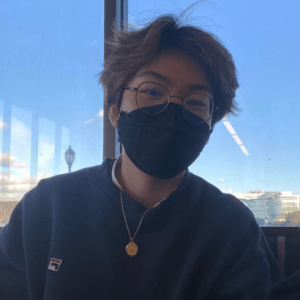Joy Chou

Please provide a brief summary of your research.
I am currently assisting professor Richard Ashley on his “Wayfinding” project. The research focuses on the effects of linguistic, mathematical, and other symbolic processing on musical comprehension. We are utilizing the music21 toolkit to analyze musical scores in terms of form, harmonic progression, melodic structure, and their interaction with musical expectations. The music21 toolkit uses Python to help us program a musical prediction model – the codes that we are aiming to generate will predict and quantify disparities between musicians and everyday listeners’ musical experiences based on their understanding of music structure.
What made you initially interested in researching your project in particular?
I am a dual degree student in music cognition and psychology, so I have always been very interested in exploring the intersection between music and cognitive sciences. In classical western music theory, we talk at length about musical expectations and how chords progress in a way that either confirms or subverts our expectations. I thought it would be very valuable to approach this phenomenon from a more mathematic and quantitative perspective.
What made you interested in pursuing (interdisciplinary) research more broadly?
I feel that there are many overlaps between music, cognitive sciences, and psychology that have not been explored at length. I wish to provide a fresh perspective (as a classically trained instrumentalist/composer) and investigate the various ways music impacts our lives. This is a topic that I am deeply passionate about, and I feel that there is not a segment of this area of study that can be completely separated from one another.
Describe your experiences with research thus far. Was it tricky? What skills do you think you’ve gained?
It has been very exciting and fulfilling working with Dr. Ashley and my lab partners. The project felt a little intimidating when I first started, given that I had to read over forty chapters of Music21 Toolkit documentation and learn how to code in python from scratch in the span of two weeks. I also read a large volume of research on musical expectations and generative models that provide context for our research. Despite it’s initial difficulty, I have learned so much from this experience in both computer programming, problem-solving and critical thinking skills. I was able to code an entire sequence of chord progressions and generate an original sequence of codes that perform “scale-degree finding functions”. Though we are still at a stage of compiling a singular cohesive model, I am hopeful and excited to see the final product of our project!
Any tips or advice you have for students similar to you that are interested in pursuing undergraduate research?
Talk to different faculty members and browse through available URAP projects! Try to see how your studies or interests align with the existing projects – it’ll make the research experience a lot more meaningful to you. Also be open to new ideas and always be ready to learn!
If you had unlimited time, money, resources, support, etc. what is something you would research?
The entire collection of Hayao Miyazaki’s films in conjunction with Joe Hisaishi’s film scores
What meme lives rent free in your head?
the mike wazowski face meme
Favorite breakfast food?
chocolate chip pancake with blueberries
What’s the most interesting thing you’ve learned/read about/listened to this week?
natural coconut water can look pink
What is your most useless talent?
i can blow air donut-like bubbles under water
